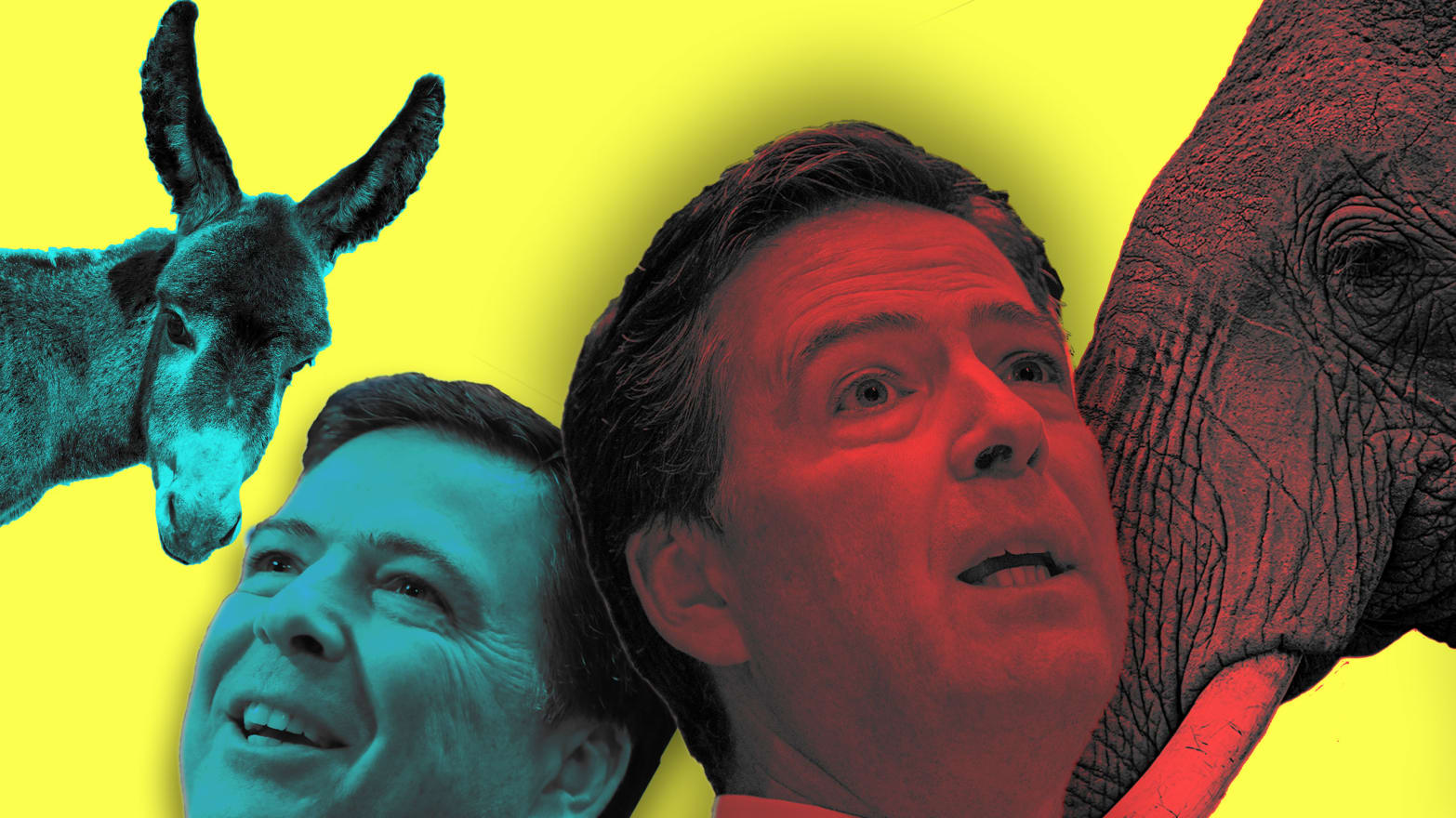Everyone spent the weekend talking about the big New York Times James Comey piece, an informative (and infuriating) tick-tock about what was going through the FBI director’s head last year as he said what he said about Hillary Clinton—and didn’t say what he didn’t say about Donald Trump.
The big takeaway may be that the reason everything happened the way it did is that everyone involved, from Comey up to President Obama, assumed Hillary Clinton was going to win. Their behavior was guided by that assumption.
In Comey’s case, he thought maybe he was establishing his independence toward the person who was going to be his next boss. In Obama’s case, it was maybe more that he didn’t want to be seen as interfering in an election and felt he didn’t need to because Hillary was going to win anyway.
All that strikes me as true. But here’s another takeaway for you, and I haven’t seen anyone make this point, and it’s an important one: If the Times is to be believed—and stories like this one, based on 30 interviews, might get some facts wrong but are generally accurate in the gist of what they convey—Comey was often motivated by fear. Fear of how a certain group would react.
We see in three instances that he feared the wrath of the Republicans. One, if he didn’t break precedent and speak harshly of Clinton while officially exonerating her last summer. So he spoke harshly. Two, if he didn’t announce in late October that the investigation was reopened. So he announced the investigation (which, as we learned too late, again amounted to nothing) was reopened.
And three, if the Republicans in Congress decided post-election to include him and the bureau in its inevitable Clinton witch hunts. So he beat them to the witch hunt, and finally said she was clear just as she drowned. The article doesn’t say this, but surely Comey also feared GOP wrath if he did confirm before the election that Donald Trump was under investigation too, which he finally confirmed last month.
We also see at least one instance in which he feared the anger of his own agents (again, with respect to speaking harshly of Clinton last summer. And we know thanks to the late Wayne Barrett’s work here at The Daily Beast that he had reason to fear them, as agents leaked freely to Rudy Giuliani, who then broadcast them on Fox News).
We even see one instance when he feared the Russians—he knew they had a certain pivotal document, and he was afraid at one point that they would leak it.
So fear of political fallout seems to have motivated almost everything he did. Kevin Drum made this point over the weekend.
But Drum didn’t emphasize what is to me the most telling thing, which is that there is one group Comey appears not to have feared at all: Democrats.
There’s a lot in the article about the thinking that went into Comey’s statement to the media explaining why Clinton would not be charged. He called her behavior “extremely careless,” you’ll recall, and spent about 15 teeing up a federal case before announcing that there wouldn’t be one.
The Times story says that Comey’s criticism of Clinton was “intended to insulate the FBI from criticism that it was too lenient toward a Democrat.” It also notes that “by scolding Mrs. Clinton, was speaking not only to voters but to his own agents.”
But nowhere does the article say that Comey feared how Democrats would react if he raked Clinton over the rhetorical coals without bringing charges. Of course he didn’t! Democrats don’t scare anybody.
As I recall things, some Democrats expressed some outrage, but it was scattered, nothing like what the Republicans would have done had the shoe been on the other foot. It took the efforts of Matt Miller, a former Justice Department spokesman for Eric Holder, to crystallize for people the contention that what Comey did was in fact outrageous. Miller called it an “abuse of power,” and he was right—and I confess that even I didn’t see things that way until I read Miller’s writings about it.
So the Times talked to 30 people, and apparently the idea that Comey may have feared how the Democrats would react to any action of his just wasn’t brought up. Amazing. Remember what the guy did: He excoriated Clinton’s ethics; he announced a reopening of an investigation 11 days before the election with no evidence that there was any reason to think Anthony Weiner’s laptop would revealing a smoking gun (it did not, as Comey subsequently announced); and finally, he kept from the public the fact that his bureau was also investigating the other presidential candidate.
And through it all, he was worried about what Republicans would do to him, but apparently never concerned about how Democrats would react to anything he did. In fact the only lengthy discussion of a Democrat in the piece involves Comey’s anger at Loretta Lynch for agreeing to meet with Bill Clinton on that tarmac; he had every right to be upset about that boneheaded move, but as the article shows—and as we already knew in real time—he didn’t care at all how Lynch and other Justice Department lawyers would react to his taking it upon himself to say the things he said about Clinton.
There are two morals to this story. The first is, well, good on the Democrats, I guess, for not playing politics (Lynch excepted) with such a sensitive matter. This is how things are supposed to work in this country.
But the second moral is that, regrettable as it may be, this isn’t how things work in this country anymore. Republicans were so ferociously partisan about everything having to do with Hillary Clinton—and Bill Clinton, and Barack Obama, and fill in the blank—that they created a reality in which the nation’s top law enforcement official was thinking more or less constantly about how he could avoid incurring their wrath. Of course, he’s a Republican himself, and was involved in Clinton probes in the 1990s, so there’s also that. But how that factored in we can’t know.
What we do know is that one political party frightens people and the other one doesn’t. The party in question needs to learn from this. And I mean right now, while Comey is investigating Trump and the Democrats are in opposition with nothing to lose. When one side has a bazooka, a sling shot won’t cut it.

